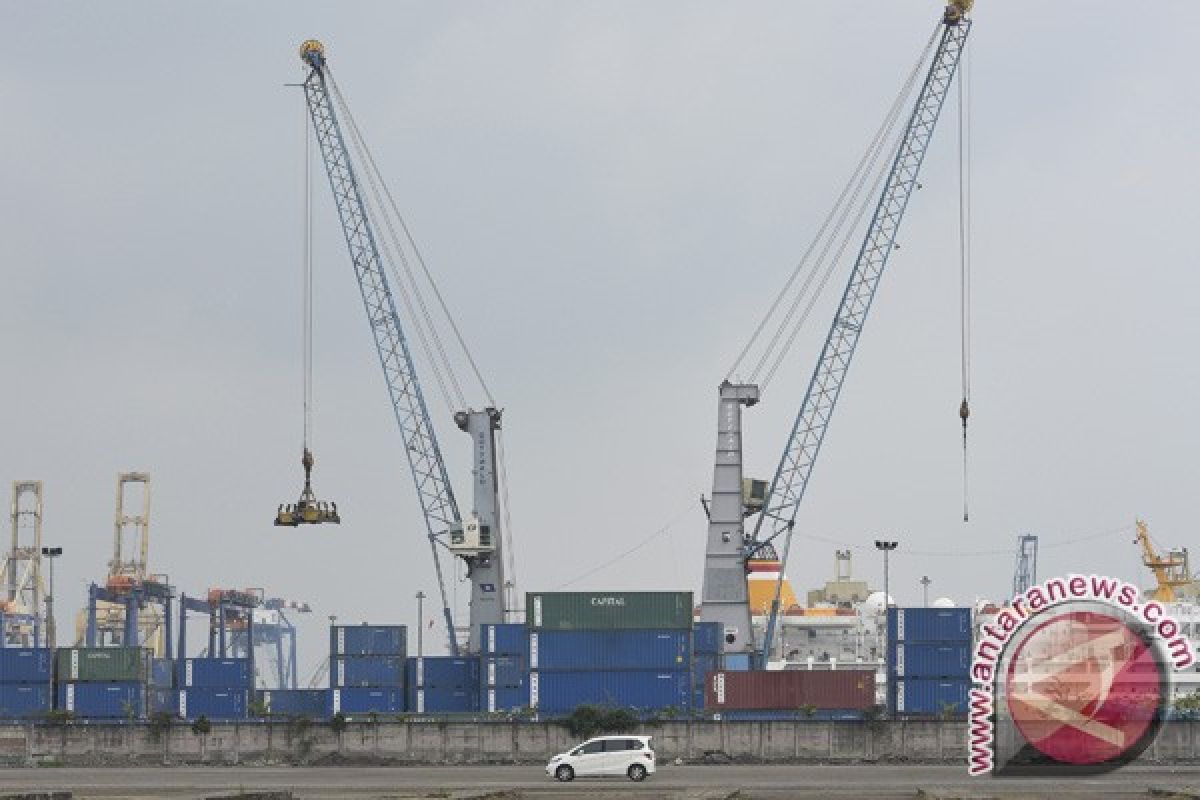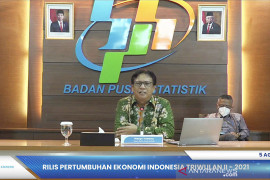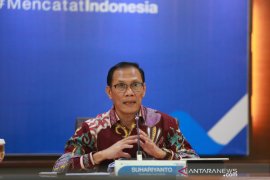I think we did a good job this year in maintaining inflation within the targeted figure."Jakarta (ANTARA News) - As announced by the Central Bureau of Statistics (BPS) on Monday, August 3, the inflation trend indicates that Indonesias current economic conditions are stable.
Although the July 2015 inflation rate increased to 0.93 percent month-to-month (mtm) from 0.54 percent mtm in June, core inflation declined.
Core inflation dropped to 4.86 percent year-on-year (yoy) in July from 5.04 percent in June.
"Core inflation dropped to 4.86 percent from 5 percent three months ago. This means that on the whole, economic components developed positively and well," BPS Chief Suryamin said while announcing the latest developments in the inflation rate of the country, on Monday.
Core inflation in July was recorded at 0.34 percent mtm and 4.86 percent yoy. This is an indicator of stable economic conditions.
Coordinating Minister for Economic Affairs Sofyan Djalil pointed out that the countrys inflation was under control in the first half of the year.
"Inflation was well under control during Ramadan in July. Even though it rose, it was still good. This indicates that regional inflation teams performed effectively," he stated.
According to Djalil, the government was successful in ensuring price stability in June and July.
If this performance can be maintained till the end of the year, he added, the inflation target of 5 percent set for the whole year will be reached.
"I think we did a good job this year in maintaining inflation within the targeted figure," he remarked.
Moreover, Deputy for Statistics and Service Distribution Affairs of the BPS Sasmito Hadi Wibowo believes that the decline in the July yoy core inflation offered a good chance for Bank Indonesia (BI) to lower its key interest rate (BI Rate).
"The decline in the core inflation rate, which now reaches 4.86 percent, can lead BI to lower its benchmark rate," Wibowo said on Monday.
He added that the lowering of the BI Rate due to the downward trend in core inflation could boost investment activities, which will help improve the performance of the countrys economic growth in the long run.
"If the benchmark rate is lowered, it will bring down lending interest rates, boost investment and generate economic growth. We will see BIs reaction towards this announcement," Wibowo remarked.
However, he refuted the opinion that the decline in the core inflation rate in July was caused by the weakening of peoples purchasing power.
Household consumption of imported goods remains high, regardless of the fact that the prices of imported goods are also falling.
"The import of goods in the form of foreign exchange has dropped. This is why they lowered their prices so we could buy their goods. They sold their goods at lower prices. If the prices are low, we can purchase a lot of goods. Our purchasing power is, in fact, still good," the BPS official explained.
In addition, as long as nothing extraordinary happens, such as drought triggered by El Nino, he pointed out that there was a possibility for the core inflation rate to continue to drop because inflation usually peaks in July.
The BPS announced on Monday that the inflation rate in July was 0.93 percent mtm.
As a result of the 0.93 percent inflation rate in July 2015, which was the same as that in July 2014, the calendar year inflation rate will reach 1.9 percent, while the yoy inflation will be 7.26 percent.
Deputy Governor of BI Perry Warjiyo said that the 0.93 percent inflation in July, which would be 7.26 percent yoy, was the highest as compared to the rates recorded in the preceding months, due to Ramadan.
"In the past five years, the average inflation rate stood at 0.9 percent. So it was still relatively under control (in July). It is important that the value drop in the months to come so that by the end of the year, it can reach the target of 4.1 percent. We even believe that the rate will not be above 4.5 percent," he stated.
Initially, the central bank had predicted that the rate of inflation in July would reach 1.12 percent, but a value lower than the first forecast was recorded, Warjiyo added.
He also pointed out that the rate in July was relatively high because inflation in the month of Ramadan was usually high.
Nevertheless, this was anticipated well in advance, thanks to the cooperation between the government and the central bank of Indonesia.
"So far, coordination between BI and the Indonesian government has been good. Therefore, food prices this year have been lower as compared to those in previous years. But air and land transportation fares were higher," he remarked.
According to the BPS, food prices and transportation fares were the major contributors to the inflation in July.
"Food commodities were still the biggest contributor to the inflation rate, followed by transpiration costs. There were high flows of Eid Fitr travelers in July this year. This made a significant contribution," BPS Chief Suryamin noted.
As food commodity prices increased in almost all parts of the country, it made the largest contribution to the rate of inflation in July.
"Transportation costs, mainly air and intercity bus transportation fares, also rose before and after Eid Fitr," Suryamin admitted.
(T.A014/INE/KR-BSR)
Reporter: Andi Abdusalam
Editor: Priyambodo RH
Copyright © ANTARA 2015












